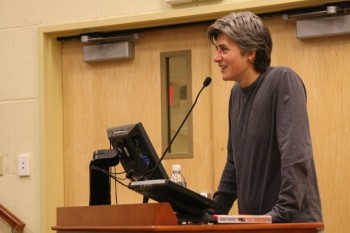Gender Investigator

Details
In pursuit of material for her bestselling 2006 book Self Made Man, journalist Norah Vincent went undercover as a guy for eighteen months. A lesbian and self-described tomboy, Vincent completely abandoned her female identity for the project. Each day she bound her chest, applied a faux five-o-clock shadow, and did her best to adopt masculine mannerisms. Her beard, made of a glue-and-hair concoction, often proved a nuisance. “Any ambient dust and cat hair tended to stick to it,” she said. “I don't know if my dates noticed that.”
In a presentation co-sponsored by SAGA, Collections Committee, and the CPGC, Vincent spoke about her experiment at Haverford on Tuesday. The journalist immersed herself in male society, she said, expecting a taste of privilege and entitlement. Instead she found a hidden world of repression and insecurity. Summing up her experience, Vincent admitted,“I didn't like it. I thought it would be like getting admission to the main event after watching from the sidelines all my life.” In reality, Vincent said, her transformation was more like joining a union--a club that sticks together in the face of turmoil.
The author's first foray into the secret lives of men came in the form of a“very gritty, very working class” bowling team. “This was my crash course in being an acceptable guy,” she said. She started to realize the things that women do but men can't, like smacking their lips after applying lip balm. She also picked up on the pressure that the men felt to be stoic, independent, and dominant.
Later, while working as a salesman, Vincent felt sucked into the trap of false assertiveness. Said Vincent,“I had to put up a front all the time. Men in our society are granted about three degrees of emotional freedom. You can't show weakness. Thanks to feminism, women can be strong, or whiny, or delicate, but men haven't enjoyed that shift. Men are still locked in.”
Vincent, whose latest book Voluntary Madness chronicles her similarly undercover experiences as a psychiatric patient, was especially curious about places off-limits to women, so she explored a Catholic monastery as Ned. “The same problems were there,” she said. “There was so much need—both from homosexual men looking for acceptable male companionship, and from straight men who also felt like their lives were missing something.”
At the end of her project, Vincent revealed herself to a few of the friends she'd made as a man.“Some of the women were still interested in dating me,” she said. But many of the men, who thought they had finally found a male friend they could really open up to, were upset to find out it was too good to be true.
“I thought this project was going to be about fixing relationships between men and women,” said Vincent. “In the end, it was more about the struggles amongst men. It's about self, and about cracking the shell.”
--Mara Miller ‘10



